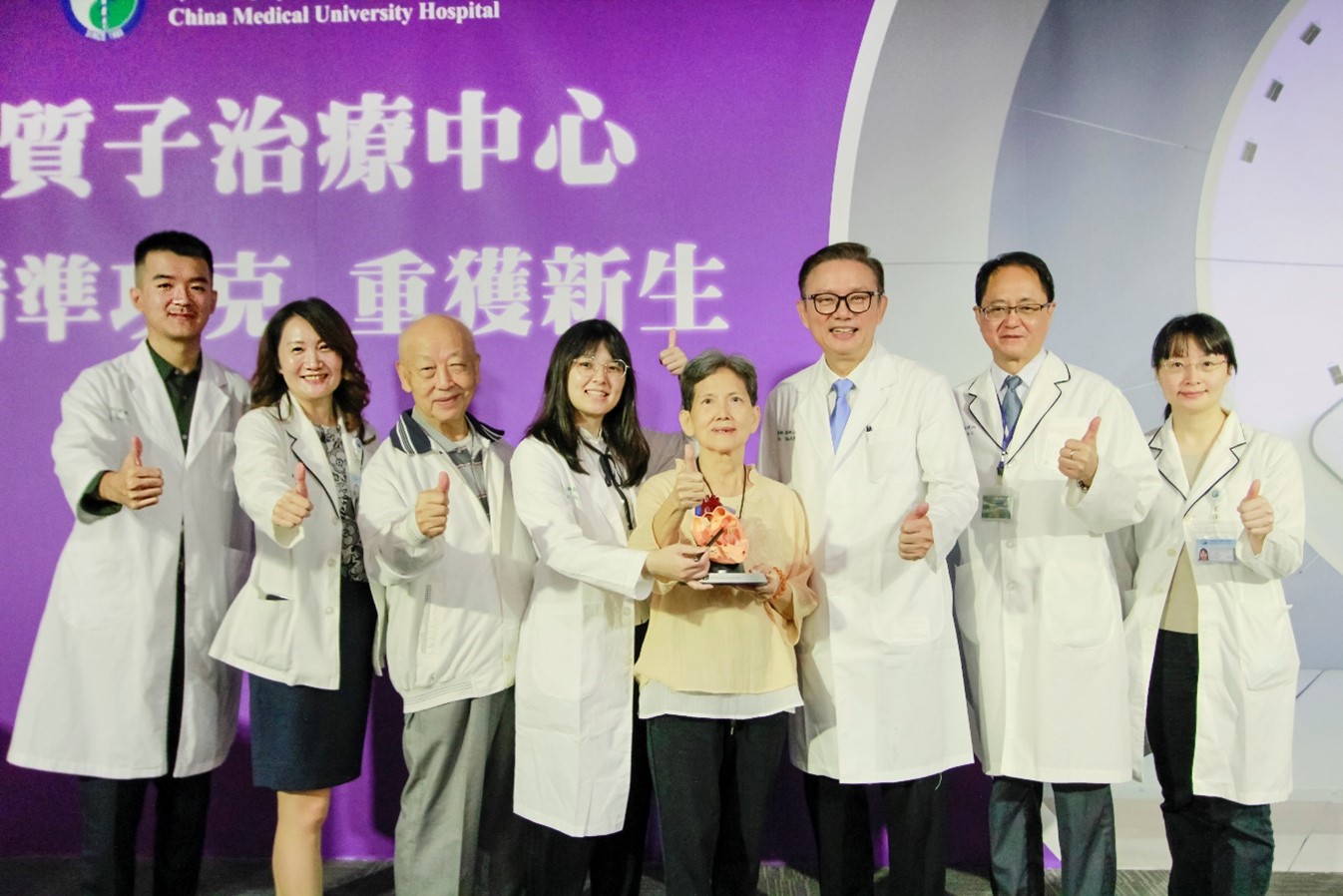News and Award
About CMUH
World's Latest Model: China Medical University Hospital Proton Therapy Center Precisely Conquers Rare Cardiac Cancer, Giving a 76-Year-Old Woman a New Lease on Health
Over the past six months, 76-year-old Ms. Bu experienced rapid weight loss and shortness of breath. In July, she visited the Cardiac Surgery Department at China Medical University Hospital (CMUH), accompanied by her husband, and consulted with Dr. Chia-Ying Wu. After a series of examinations, they discovered a tumor approximately 6 centimeters in size on her heart. This tumor had severely affected her blood circulation, causing symptoms like palpitations, chest tightness, and breathing difficulties. Post-surgery, the diagnosis revealed she had a rare malignant soft tissue sarcoma in the heart.

Due to the tumor’s challenging location, complete surgical removal was not possible. Her family worried that traditional chemotherapy and radiation therapy side effects would be too difficult for her body to endure. Therefore, based on the evaluation and recommendation of Superintendent K.S. Clifford Chao and the medical team, Ms. Bu underwent treatment at the hospital’s Proton Therapy Center—the first in central Taiwan, launched in July this year—using the world’s latest proton therapy equipment, the Varian ProBeam® 360 system. After the treatment, Ms. Bu gratefully remarked, "I was worried that, given my age, my body wouldn’t be able to handle cancer treatments. But to my surprise, I experienced almost no discomfort during the treatment. I’m especially grateful to Superintendent K.S. Clifford Chao and the medical team for giving me the confidence and courage to face cancer and giving me a new lease on life."
(1).jpg)
Dr. Chia-Ying Wu from CMUH’s Cardiac Surgery Department noted that the prevalence of cardiac tumors is about one in ten thousand, with one-quarter of these being malignant. In the early stages, malignant cardiac soft tissue sarcomas often show no symptoms, but in later stages, they may cause chest pain, shortness of breath, palpitations, irregular heartbeats, or swelling in the legs and abdomen, making cardiac tumor treatment highly challenging.
(1).jpg)
Superintendent K.S. Clifford Chao of the Proton Therapy Center explained that the team uses the unique advantages of proton therapy for tumors located in sensitive areas or close to critical organs, allowing for precise treatment of cardiac tumors. During treatment, the proton therapy team at CMUH monitors and tracks the radiation process and potential side effects daily. Under the professional care and support of the medical team, Ms. Bu received outpatient treatment sessions lasting 30 minutes each, without needing hospitalization, and completed a total of 30 proton therapy sessions over approximately 1.5 months.
Proton therapy is an advanced form of particle radiation therapy. Compared to traditional X-ray radiation therapy, proton beams act like deep-water bombs, focusing energy precisely on the tumor, sparing surrounding healthy tissues, reducing side effects, and increasing cancer control rates. CMUH’s Proton Therapy Center is the first in central Taiwan and the fourth in Taiwan overall. The high precision and low side effects of proton therapy allow patients to receive higher doses of radiation without increasing the risk to healthy tissues. This contributes to improved treatment outcomes, shorter treatment times, and a reduced risk of recurrence.



![[Taiwan–Malaysia Medical Innovation Forum] CMUH and UNIMAS Co-Host Major Medical Symposium to Advance Medical Technology and Precision Patient Care img](/FileUploads/News/20250714_131324.jpg?w=250&h=180&mode=crop&scale=both)